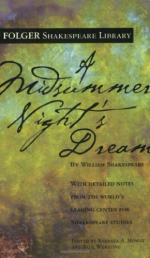|
This section contains 987 words (approx. 4 pages at 300 words per page) |

|
What Fools These Mortals Be
Summary: Throughout A Midsummer Night's Dream, a comedy written by William Shakespeare, foolishness is established very effectively as noticed by Puck, a fairy, when he states, "What fools these mortals be" (3.2.115). Moreover, not only do the lovers, and the players demonstrate foolishness but the fairies themselves. In dealing with love these characters are forced into foolishness.
Throughout A Midsummer Night's Dream, a comedy written by William Shakespeare, foolishness is established very effectively as noticed by Puck, a fairy, when he states, "What fools these mortals be" (3.2.115). Moreover, not only do the lovers, and the players demonstrate foolishness but the fairies themselves. In dealing with love these characters are forced into foolishness.
As the lovers turn love into a game of cat and mouse, foolishness is demonstrated. Helena is chasing Demetrius, one that despises her, while Demetrius is chasing Hermia who is with Lysander. The motive behind this chase through the woods is because of Helena who is a fool in pursuing Lysander and Hermia's plan to Demetrius just for some affection as when she expresses in her soliloquy, " Pursue her; and for this intelligence/ if I have thanks, it is a dear expense" (1.1.248-249). In the forest at the dark hours of time, Hermia...
|
This section contains 987 words (approx. 4 pages at 300 words per page) |

|


